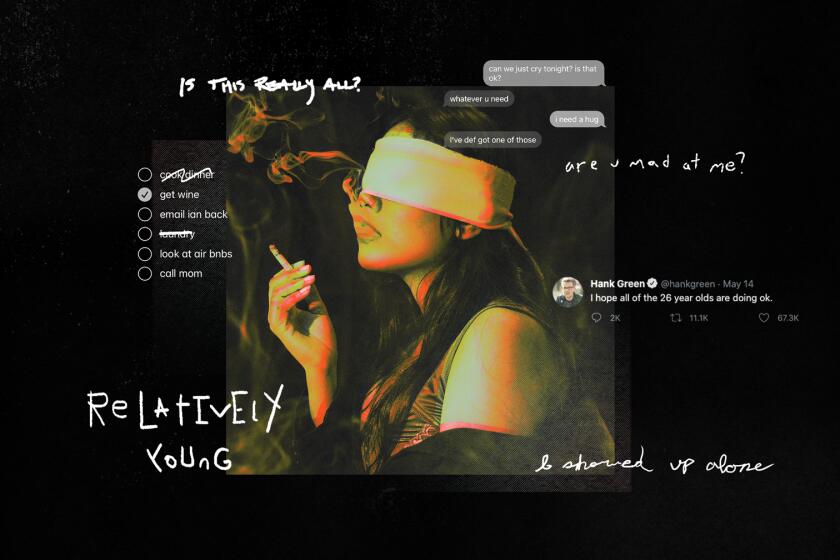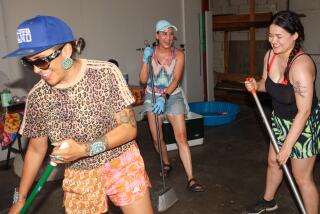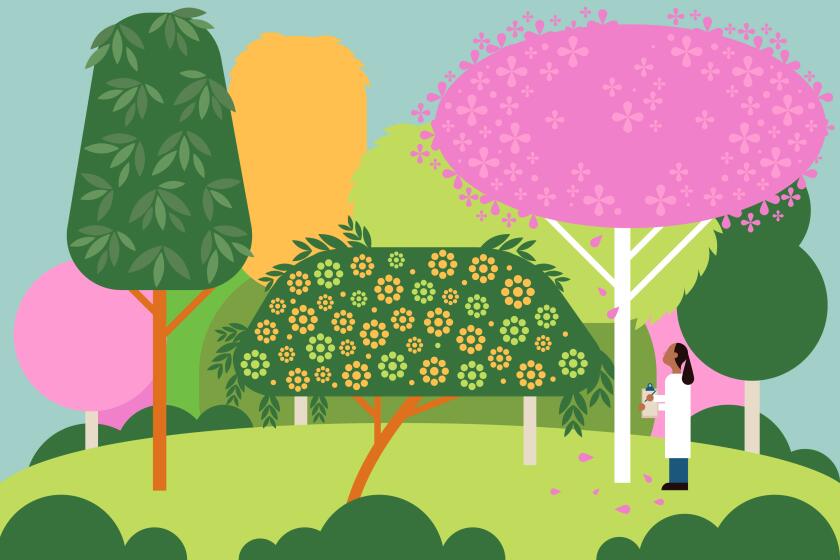It’s not just you — finding therapy in L.A. sucks. Meet the woman trying to change that
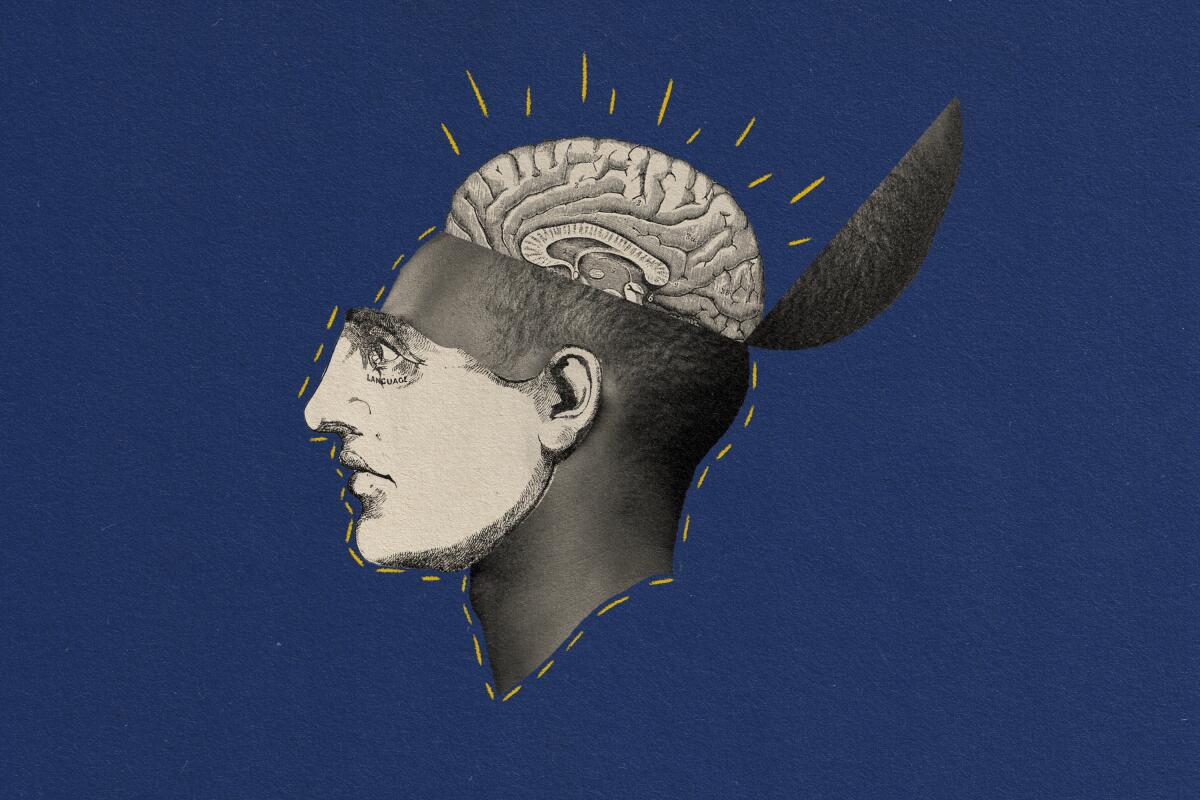
Therapy can be transformative and healing.
Just ask Christy Desai of Okay Humans, a new brand hitting the L.A. therapy scene. “I’d had my own experience in therapy that was life-changing,” Desai says. “I always feel dramatic when I say life-changing, but it really was life-changing. It was this internal experience where I saw the world and people in a whole new way and was able to show up in new ways and be a better person for myself and for people I loved.”
L.A. woodworker C.C. Boyce is reevaluating what happens when a person dies by turning ashes into planters.
Sounds great, right? Sigh, if only finding that transformative care were as simple as that.
First there are the internal and societal roadblocks: family or social stigma; confronting generational trauma;realizing you should go in the first place, especially if no one around you has. Then comes the issue of how to find a therapist: getting recommendations, reading up on enough technical therapy jargon to know what you’re talking about and advocate for yourself, then calling office after office, only to find out that your schedules don’t align. Or they don’t take your insurance. Or you just don’t vibe with the therapist, period. Oh, and then you have to remember to submit a claim to your insurance — if the therapist takes insurance (a big if) — and say a little prayer that they process it; and give your therapist your out-of-pocket copay, sometimes by cash or check only (who carries those anymore?!).
All the conventions of actually getting therapy are clearly stuck in the past, alongside the negative social perception of seeking mental health help. As that eases, shouldn’t the complicated and bureaucratic process ease too?
Enter Desai, a licensed marriage and family therapist, who thinks she has a solution to making securing therapy even slightly less hellish. She’s starting with a bricks-and-mortar location for Okay Humans, but going into the physical office is just about the only old-school thing about it. We caught up with Desai to chat about her new venture and the changing world of therapy.
This interview has been edited for length and clarity.
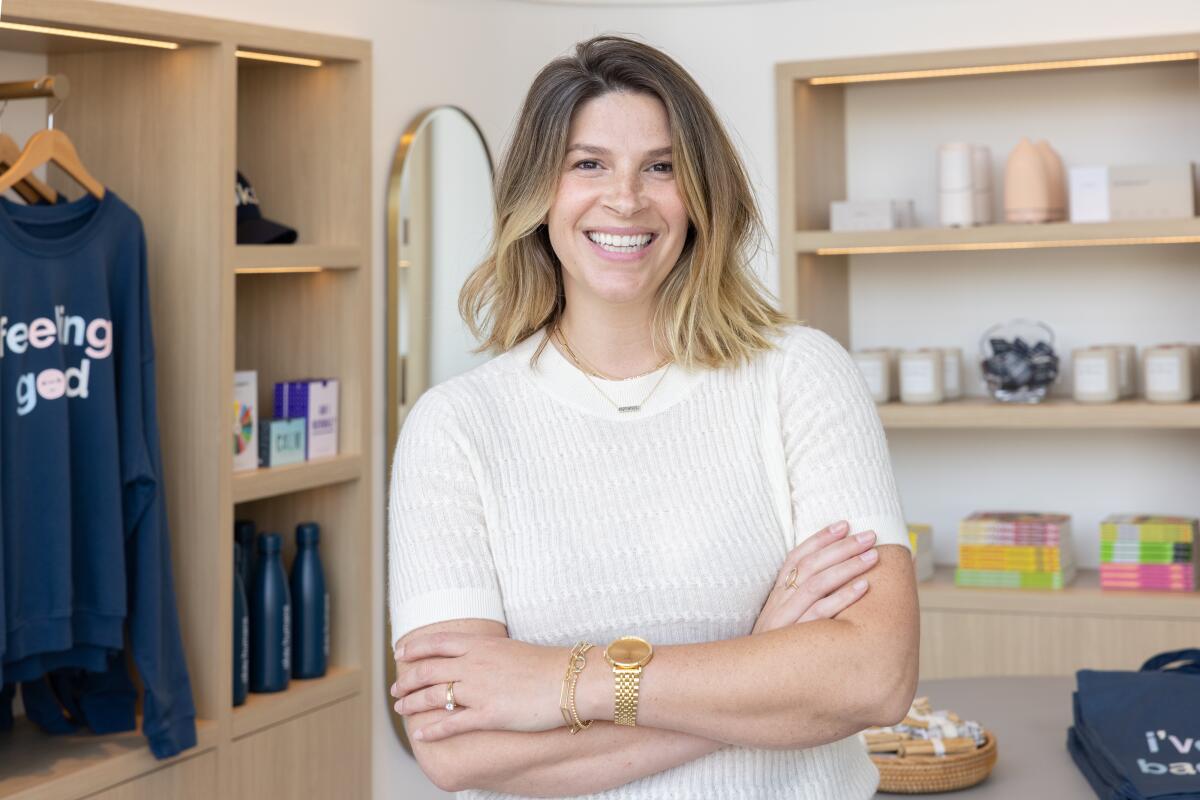
What was the inception of Okay Humans like?
There were little thoughts or questions I had over time that culminated, ultimately, into this bigger question, which is: “Why is it so hard to find therapy, why is it hidden, why are there so many hurdles?”
There are so many people who don’t know about it, who hesitate or have a lot of misconceptions around it. So we wanted to demystify and normalize it and make it easier for people to get therapy.
Most psychotherapy offices are individual solo practitioners. It’s really splintered and it’s siloed off. It can be really overwhelming to call all these private practices. We wanted our brand to lend trust and to make people comfortable and know where to start.
So, what are some of those hurdles?
Many people are reluctant to even start the process because it’s daunting, overwhelming and carries the stigma that something must be wrong with you if you’re seeking help. The stigma contributes to individual shame. Once you start the process, it’s hard to find a therapist, and then you’re waiting for a call back just to find out their availability. If you get that far, the search for tucked-away office buildings is stressful and makes it feel like there is something you should be hiding.
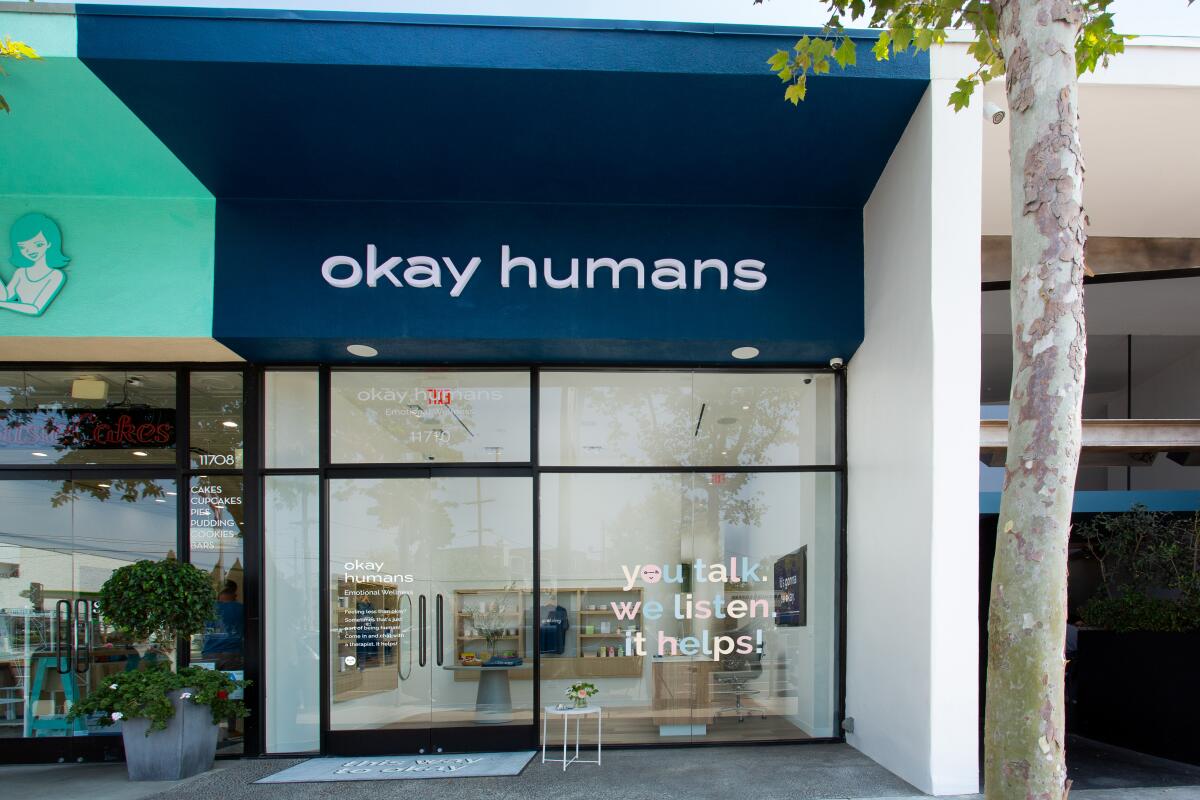
Sounds like it could use a reboot. What should modern therapy look like?
The magic that happens between a therapist and guest during a session doesn’t need any changing, but [modern therapy] should be as approachable and convenient as possible. The experience around seeking talk therapy is where we aim to revolutionize the industry. Being on a busy street opposed to being hidden in a medical building is a big step towards destigmatizing any shame that may come along with seeking therapy. Our beautiful space makes you feel at ease instead of dark, dusky offices. Modern therapy should be visible, nonjudgmental and completely normal to not only talk about, but to utilize.
Is your target demographic people who have never been to therapy or those frustrated with the old model?
I think both. I think there are a lot of people who are on the sidelines who are interested in personal growth and think, “Man, I wish I could talk to somebody about this,” but starting is overwhelming. And then I think there are people who maybe just haven’t found the right therapist or want to reenter therapy after taking a pause.
For those who have been in therapy before, what’ll be new — and not new — about Okay Humans?
The magic that happens in the room that is therapy — that will be familiar; that will be the same. But everything around getting to therapy and after therapy — we really feel we’ve enhanced it, and really kind of wrapped experience around it where there hadn’t been one.
26-year-olds are sharing the pains of their age: “Society is like, ‘You’re not thinking about having kids or getting married? What’s your aspiration, what’s your goal?’”
We’re more modern in that we have a booking app, so you can see right away a therapist’s availability and watch a video bio and see a written bio and book with them. And your therapist can send you a note after your session that might have quick tips or a link to a podcast you talked about. There’s a journal as well so you can take notes from your session or do a gratitude journal. The first time you come you’ll check in with our maitre d’, but then you’ll be able to check yourself in on the app anytime after that if you want to.
And then payment — we have a membership model that makes it more affordable to come once a week, which is typical of therapy, and we’re at this price point where it’s not high in private-practice prices. We submit insurance claims on guests’ behalf so they can save 45-80% on sessions without the headache and hassle that currently exists by submitting all of that yourself. (An Okay Humans session is $124.)
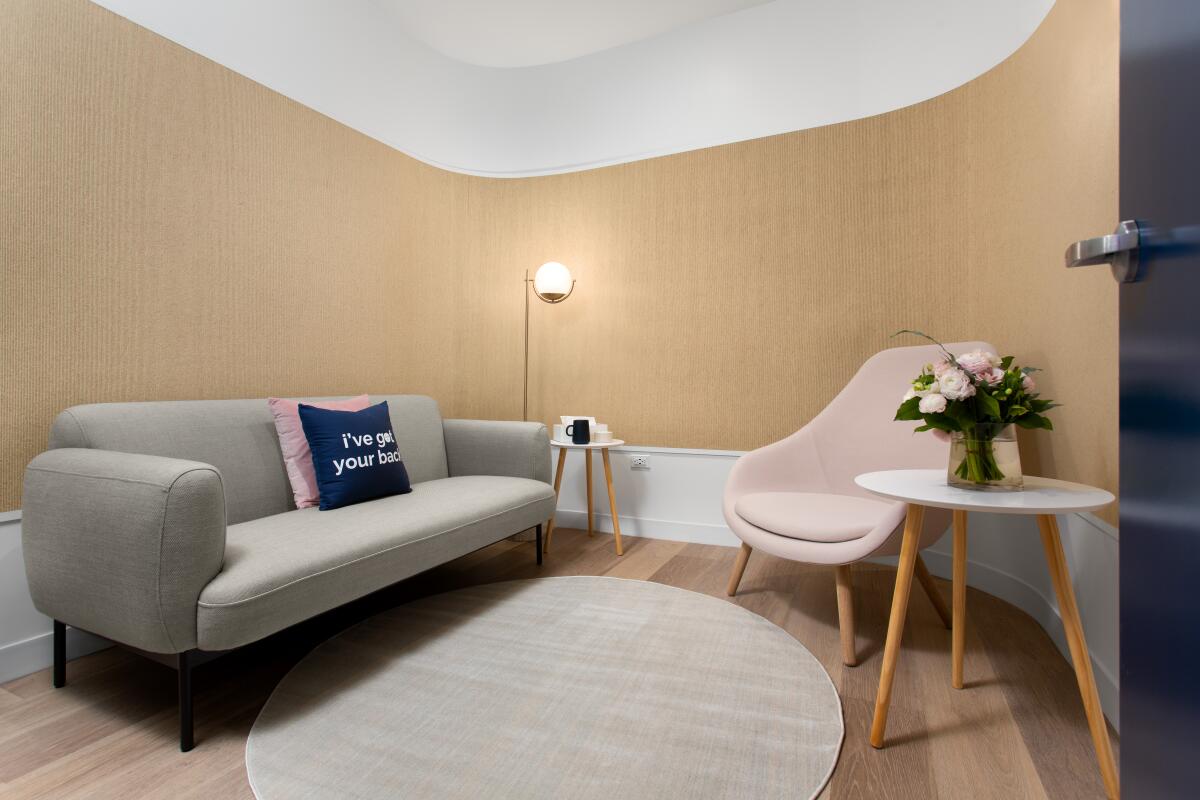
What are some of the highlights of the space?
I find it to be really beautiful. There’s this beautiful hallway and the suites are around it — our architect conceptualized it as a symbolic hug.
We have cute little things that make it a little more fun. There’s a lounge with the “MentaliTea Bar” that’s just this beautiful space where you’ll get some refreshments before your therapist comes and gets you. We have what we call the “Post-Sesh Refresh,” so within our therapy suite there’s a little mirror and face wipes and Visine and mints. So if you had a tough session you can catch your breath and put yourself back together.
We have the wellness shop at the front of the location which is a bit unique. So with the books and candles and different things in the front we look like a retail shop or a cute little gift store from the outside, and then it’s this beautiful space where meanwhile, tucked inside there are people learning about themselves and growing and changing.
Some newer therapy models have tried to modernize the practice by offering online sessions. Why was keeping Okay Humans in person important to you? What else sets it apart?
As a therapist and as a client, there is something about being together and in person. So much communication is nonverbal. Thank goodness people could do teletherapy throughout this pandemic, and we really want everyone to get help in whatever way they can access it, but therapy is really about the relationship. So when you can be with someone and have a felt experience, it’s just different.
One thing that sets us apart is the storefront and being visible. Symbolically or not, I think there’s a lot of power in people seeing a sign and walking by a place and knowing you can go get therapy there.
Are you offering sessions too?
I’ll have a smaller caseload, but I will see four to five clients a week. That’s what I love to do.
Okay Humans opens July 27 at 11710 San Vicente Blvd. in Brentwood, and bookings are now open on the app.
More to Read
Sign up for The Wild
We’ll help you find the best places to hike, bike and run, as well as the perfect silent spots for meditation and yoga.
You may occasionally receive promotional content from the Los Angeles Times.

